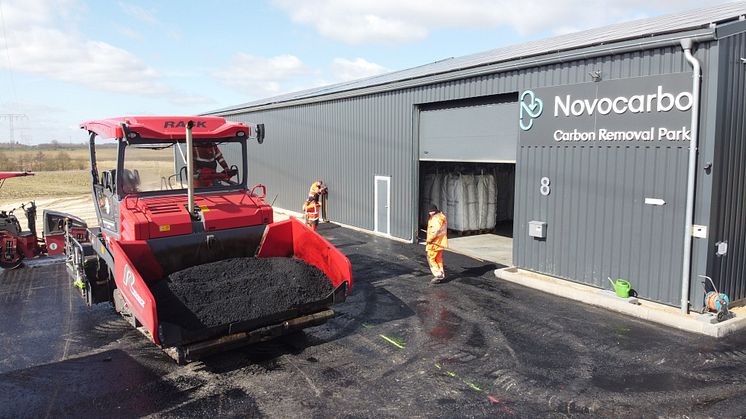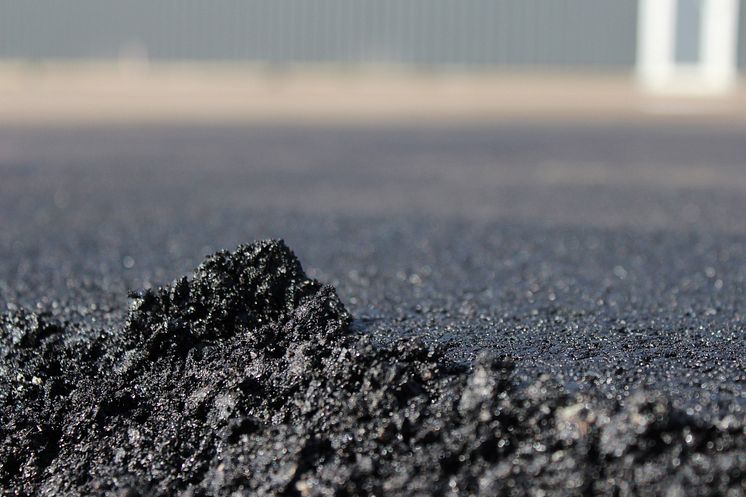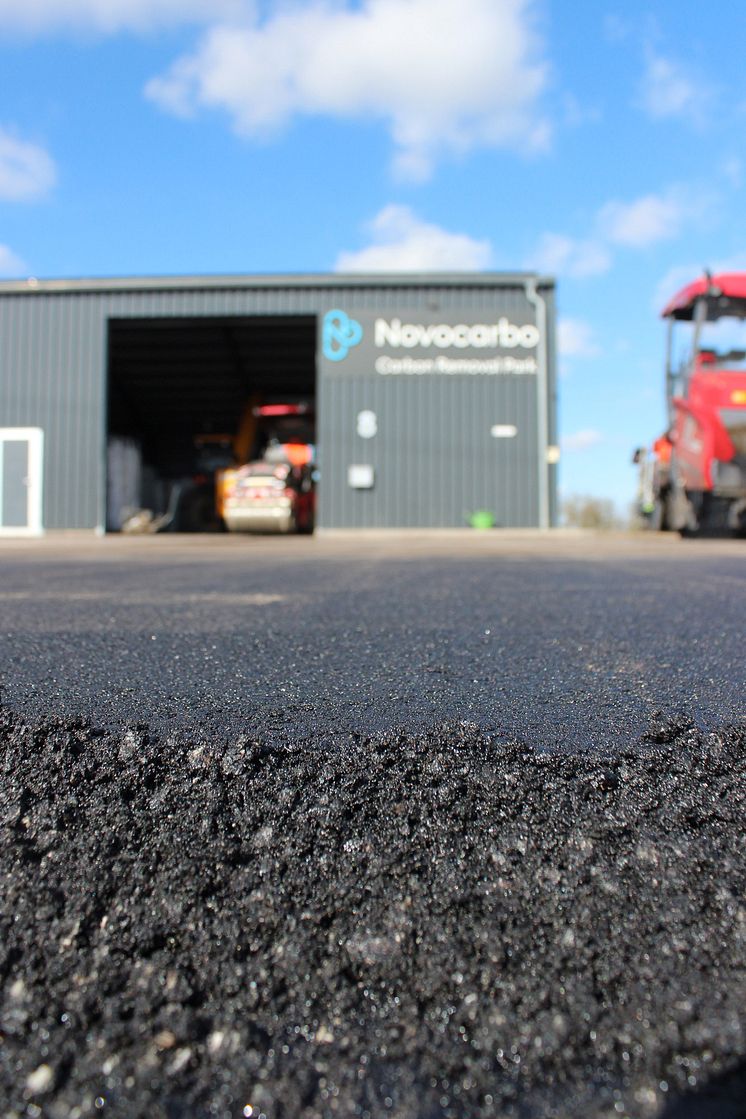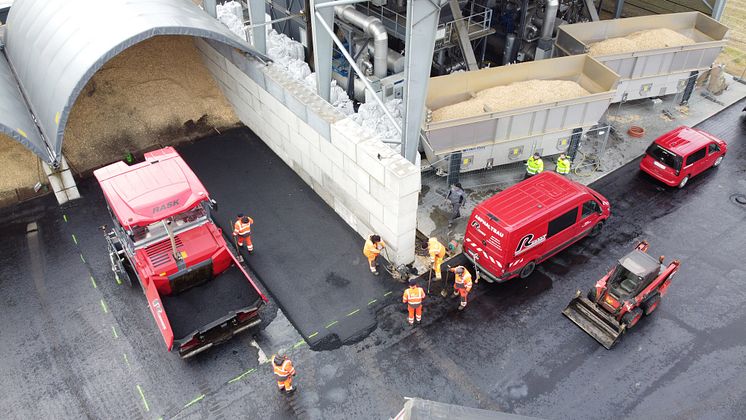
Pressemitteilung -
Turning Asphalt into a Climate Solution
What if roads could help slow down or even reverse climate change? This bold idea is becoming reality in Northern Germany, where a pioneering pilot project is demonstrating how road construction can become not only more sustainable, but a part of the climate transition. Novocarbo, a leader in carbon removal technologies, has partnered with Hansa Asphalt to bring a new asphalt mix to the road – one that stores carbon long-term while enhancing material performance.
Hamburg/Grevesmühlen, Germany – [June 26, 2025] – Infrastructure and climate action don’t have to be at odds. In an innovative pilot project, Novocarbo GmbH and Hansa Asphalt GmbH have developed an asphalt mix infused with biochar, a carbon-rich material made from plant waste. The test has delivered promising results and may lay the groundwork for future standards in road construction.
“If we succeed in turning road construction into a means of storing carbon, it opens up a whole new perspective for the infrastructure sector,” says Caspar von Ziegner, CEO of Novocarbo. “Biochar can not only ease the burden on the climate but also deliver functional advantages.”
Sustainable Road Construction with Biochar
The pilot took place at the Carbon Removal Park Baltic Sea in Mecklenburg-Western Pomerania. Fine-grained biochar (<5 mm) was added at a 3 % ratio to the top layer of asphalt – roughly 7 metric tons in total. The results show several key advantages:
- Greater material efficiency: same mix volume, more surface coverage
- Raw material substitution: potential to replace filler materials or even bitumen
- Permanent carbon storage: Creation of carbon removal credits
Additional analyses, including core sample testing, are underway to examine long-term performance benefits such as:
- Higher durability: better resistance to temperature fluctuations and aging
- Improved stability: reduced rutting and increased stiffness
Studies and initial laboratory results support these findings: In suitable mixtures and with the right formulation, biochar increases the viscosity of asphalt binders.
Climate Impact and Carbon Credits
The project captured permanently around 75 kg of CO₂ equivalent per ton of asphalt – adding up to 17.5 tons across the test site. These carbon savings are certified by Novocarbo as Carbon Removal Credits and independently verified. The credits can be sold to companies seeking to offset unavoidable emissions. This combination of technical functionality and climate impact makes biochar a powerful lever for sustainable construction projects.
Next Steps and Perspectives
A commercial launch is scheduled for fall 2025. Meanwhile, Novocarbo is expanding testing and forging new partnerships with construction firms and research institutions. “Our vision is scalable, climate-friendly infrastructure – starting with roads but extending far beyond,” says Caspar von Ziegner.
A Growing Future Market
The global asphalt market is projected to surpass $370 billion by 2032, and pressure to decarbonize is mounting. Biochar could play a key role, if regulatory requirements, such as limits on polycyclic aromatic hydrocarbons (PAHs), are met. Novocarbo ensures compliance through rigorous quality controls and certified biochar products.
About Novocarbo GmbH
Novocarbo is a pioneer in carbon removal and one of Europe’s leading producers of high-quality biochar. At its Carbon Removal Parks, the company transforms plant biomass into biochar through pyrolysis – permanently storing carbon while generating renewable energy. Biochar is used across construction, landscaping, and agriculture.
About Hansa Asphalt GmbH & Co. KG
Established in 1967, Hansa Asphalt is a trusted supplier of high-quality asphalt products. With cutting-edge technology and a growing focus on sustainability, the company serves clients in industry, local government, and the construction sector.
Links
Themen
Kategorien
Novocarbo treibt die Dekarbonisierung mit einem einzigartigen Konzept voran: Das Hamburger Start-up betreibt Carbon Removal Parks, mit denen es bis 2030 bis zu 1 Million t CO₂ der Atmosphäre entziehen kann. Mit moderner Pyrolyse-Technologie verarbeitet Novocarbo pflanzliche Reststoffe zu Pflanzenkohle (Biochar). Der in der Biomasse vorhandene Kohlenstoff wird gebunden und in der Pflanzenkohle gespeichert. Die Pflanzenkohle hat vielfältige positive Effekte in der Landwirtschaft, in der Bau- oder Textilindustrie.
Beim Pyrolyse-Prozess entsteht zudem regenerative, klimaneutrale Überschussenergie. Diese kann in Form von „Heat-as-a-Service“-Partnerschaften Unternehmen oder Stadtwerken angeboten werden. Als Pionier des Handels mit Kohlenstoffentnahmezertifikaten nimmt Novocarbo eine Vorreiterrolle bei der Entwicklung von Biochar Carbon Removal Lösungen ein. Die erzeugte klimaneutrale Wärme kann in Form von „Heat-as-a-Service“-Partnerschaften Unternehmen oder Stadtwerken angeboten werden.





